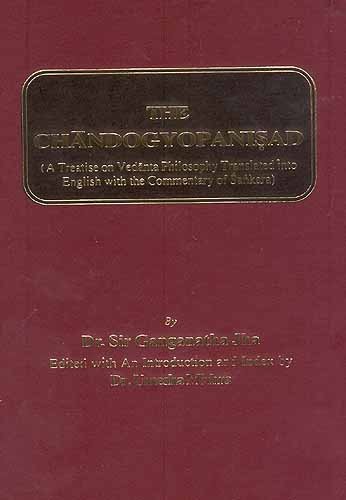Chandogya Upanishad (Shankara Bhashya)
by Ganganatha Jha | 1942 | 149,749 words | ISBN-10: 8170842840 | ISBN-13: 9788170842842
This is the English translation of the Chandogya Upanishad, an ancient philosophical text originally written in Sanksrit and dating to at least the 8th century BCE. Having eight chapters (adhyayas) and many sub-sections (khandas), this text is counted among the largest of it's kind. The Chandogya Upanishad, being connected to the Samaveda, represen...
Section 7.9 (ninth khaṇḍa) (two texts)
Upaniṣad text:
‘Food indeed is greater than Power.—Therefore, if one does not eat for ten nights,—even if he keeps alive, he is unable to see, unable to hear, unable to reflect, unable to understand, unable to act, and unable to know.—And when he comes by Food, he is able to see, able to hear, able to reflect, able to understand, able to act, and able to know,—Meditate upon Food.’—(1)
Commentary (Śaṅkara Bhāṣya):
Food indeed is greater than Power,—because it is the source of Power.—It is next explained how Food is the source of Power. Because Food is the source of Power, therefore, if one does not eat for ten nights, he would (ordinarily) die, on account of the loss of Power or strength which is due to the use of Food; if, however, he does not die,—even if he lives;—(which is not unlikely) as we find people keeping alive after having fasted for a month;—but even though he may keep alive,—he is unable to see and unable to hear—the words of the teacher, and so forth i.e. it becomes all contrary to what he was before. And when, having fasted for several days and having been unable to perform the functions of seeing, hearing and the rest,—he comes by Food;—‘āya’ is coming; hence ‘annasyāya’ is coming by Food; and one who has come by Food is ‘annasyāyī’; the form ‘āyai’ is got at by a change in the vowel; the reading ‘annasya-āyā’ also gives the same sense; because we find the effects described in the form of ‘being able to see’ and the rest. As a matter of fact, it is found that when one makes use of Food, he regains the faculty of seeing etc., which he does not do if he does not get Food.—Meditate upon Food.—(1)
Upaniṣad text:
‘One who meditates upon Food as Brahman attains regions supplied with Food and Drink; and he is free to act as he wishes in the sphere within reach of Food;—one who meditates upon Food as Brahman.’—‘Is there anything greater than Food; Revered Sir?’—‘Certainly, there is something greater than Food.’—‘Explain it to me, Revered Sir.’—(2)
Commentary (Śaṅkara Bhāṣya):
The reward accruing to the man supplied with Food is as follows:—He attains Regions, supplied with large quantities of Food, also those supplied with Drink— with large supplies of water,—Food and Drink always go together.—The rest is as before.—(2)
End of Section (9) of Discourse VII.
